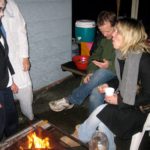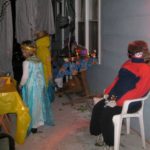Porch Party 2011
We have a rather long side porch. On trick-or-treat night, we fixed it up in creepy fashion. I stuffed pants and shirts and placed them on chairs to look like scarecrows. Plastic spiders, snakes, and mice were peppered near candy bowls. Votive candles and illuminated pumpkins lit the way. We used the internet to stream in 50s-60s themed music (Think Monster Mash and the rest). Out in the back, our fire pit made a toasty atmosphere on a chilly night; and coffee, warm cider, and cookies added to the warmth, on a few levels.
The most fun was meeting new neighbors, re-connecting with known neighbors, and talking with them. I realized that there isn’t another “holiday” like this one. Thanksgiving, Christmas, and Easter usually involve travel, plenty of food prep, and a different schedule for school or work. Not Halloween. What other time do you have dozens of neighbors interacting with you on your property…at night? It’s a unique night. It’s an opportunity.
Our visitors and friends loved the decor and seemed touched by the effort. Can I say there was joy? Can I say that, for this sort of thing? Well, there was.
I had more time this year, so I sort of “caught the bug” and went all-out. I don’t think is was the Halloween spirit either. It was the Christmas one, arriving early…like department store merchandise. And in the middle of all that good cheer, I wondered, why don’t communities, groups, or Christians team up more often create a safe, fun, and loving atmosphere for these kids and families that come to visit every year? That’s a wasted opportunity, is it not?
I learned some other amazing things:
1. When you prepare to love on people, they “get it”. (Open appreciation: Everyone wore smiles, and said thank you–a lot! It was a delight to just be giving. I got more than I gave. Seriously.)
2. Being welcoming doesn’t take much money. (I was planning to buy candy for trick-or-treaters anyway. I used things I already had to decorate, and my neighbor joined in–donating decor, and cookies.) Pretty cool, huh?
3. My kids love to host and create community. In this way, they learn compassion and kindness. All on their own, they handed out treats, informed visitors of our “amenities”, interacted with the children, and helped people find their way around. How else would I have gotten to see this?
4. It’s only 2 hours. While some parties can linger, and take lot of food prep time, have logistic issues, trick-or-treat night is a specified time with a fairly easy menu. Most people make the time for it, somehow. For our neighborhood, it lasts from 6-8p.m. It’s not too hard to get some extra things ready to make it a more memorable and a special time for visitors.
5. It shines a light in the darkness. Times are tough, and there a lot of bad news and bad things happening in the world. It’s nice to give people something good. I find it totally ironic that this could or should be best served on Halloween. But why not? No day can shut out God’s Light and Love. (This also gives new meaning to the phrase “Take Back the Night”, yeah?)
Here’s some important background information
As a kid, raised in a very conservative (i.e. fundamentalist) Christian home, and my parents believed that going out for candy in costume on or near October 31st was colluding with the Devil. “It’s Satan’s Day,” I used to hear. Strangely enough, for all our protesting of it, the (unintentional) focus was more on Halloween and evil, than it was for any typical trick-or-treater. Now, that’s whack. Sometimes our efforts to be “righteous” (or whatever) have the opposite intended consequences. It seems we had it all backwards. Reinvention is key. Hospitality can happen any day or day. Take back the night with grace and love, or at least some goodwill to men!
Is Halloween a Christian Holiday?
Well, I’ll be honest and say I had no plans to hand out tracts, or influence a conversion experience on my porch. I wasn’t sharing verses or inviting people to my church. But, it was a rather blessed time. If anyone got the message that we made a spot for them in our week, then we accomplished a lot. Maybe a lot more than the typical church (which can feel like a club) can do most nights of the week.
I don’t think I’ve had the chance to touch so many lives in such a short time, as I did on that nigh. And to borrow Eric Liddell’s phrasing (think of the ancient “Chariots of Fire” film), “I feel God’s pleasure.” Parents and kids alike remember who was kind and who had a fun place to visit. And that, my friends, is shining a light. (The short answer is just, “Yes,Halloween is a Christian Spiritual practice–now“.)
Have you ever done this sort of thing for Halloween night? If not, give it a try. You can make some effort to spread more love and good cheer on this night too. If you do, let me know how it went.
Here are some photos of our night:










